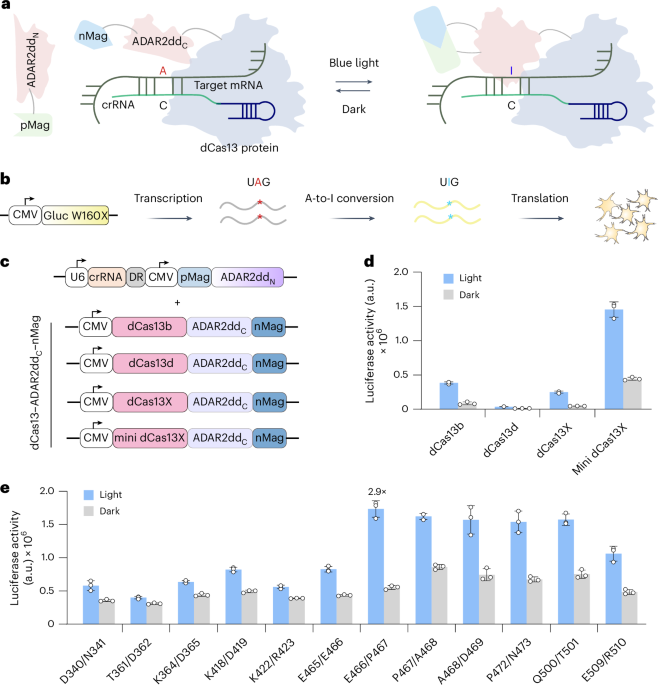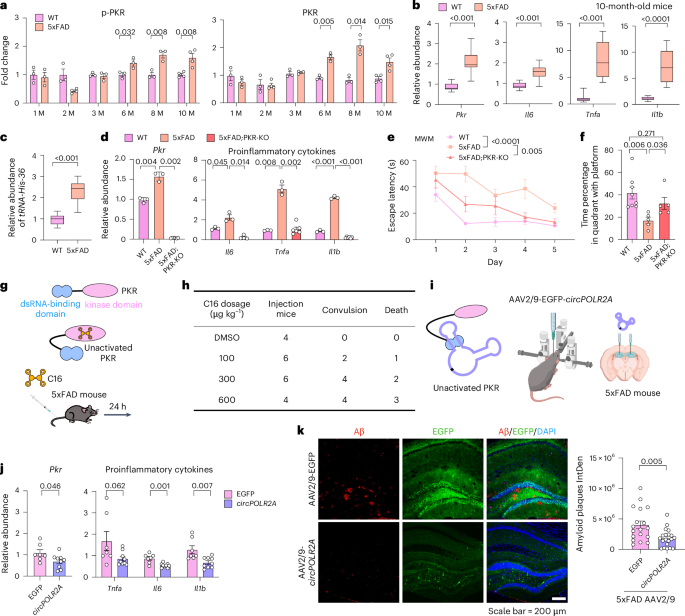Now Reading: Scientists Develop Photoactivatable RNA Base Editor for In Vivo Gene Therapy
-
01
Scientists Develop Photoactivatable RNA Base Editor for In Vivo Gene Therapy
Scientists Develop Photoactivatable RNA Base Editor for In Vivo Gene Therapy

Quick Summary
- The article appears to discuss recent advancements in RNA editing technologies, genome-based therapies, and their applications.
- Specific technologies highlighted include CRISPR genome editing and mechanisms that allow the recruitment of endogenous ADAR enzymes for precise RNA modifications.
- Articles referenced explore topics such as optogenetic control of RNA metabolism, drug-induced splicing regulation for gene therapies, engineered light-switchable RNA-binding proteins, and programmable modifications in therapeutic settings.
- These studies underline the promise and challenges associated with gaining therapeutic precision in controlling genetic functions through innovative tools like circular guide RNAs for efficient in vivo use.
Indian Opinion Analysis
the developments discussed represent notable progress in genomic medicine globally. for India, where biotechnology research is growing rapidly alongside a robust pharmaceuticals sector, these advancements could open avenues to both enhance domestic innovation capacity and participate in global collaborations. The implications range from improving treatment methods for genetic disorders to making advanced therapies more accessible via cost-efficient innovations tailored to local health demands. Though, careful consideration must be given to ethical frameworks governing gene-editing techniques while fostering talent pipelines essential for this cutting-edge science.
Link provided for further readingQuick Summary:
- The news article appears to be an academic discussion or reference on advancements in RNA editing technologies.
- Several references are cited, ranging from Nature Biotechnology, PubMed, and Google Scholar. These include research on RNA editors such as ADARs and CRISPR-Cas systems.
- Key methodologies include site-directed RNA editing involving tools like circular guide rnas, SNAP-tagged ADARs, compact Cas13 proteins for programmable RNA base editing, and light-induced mechanisms for endogenous RNA modifications.
- Prominent journals mentioned: Nature Methods, Science, Cell chemistry & Biology, among others.
Indian Opinion Analysis:
Advancements in RNA-editing technologies, as presented in this research-centered report, hold profound implications globally-particularly relevant for India’s growing biotechnology sector.With applications ranging from genetic therapies addressing diseases such as cystic fibrosis to enabling precision-driven medical solutions via molecular engineering approaches like CRISPR-Cas systems or photolabile guide RNAs (light-triggered systems),the technology could redefine medical care standards.
A neutral observation is that India’s robust academia-industry collaborations must build awareness of these innovations to remain competitive internationally while exploring ethical frameworks around them-for instance, managing gene-editing’s impact responsibly across ecosystems.
Read more: Google ScholarQuick Summary
- The article focuses on developments in RNA editing technologies using ADAR and CRISPR-based tools.
- Research highlights include advancements in photoactivatable RNA base editing mechanisms and engineered proteins for selective site-directed functionality.
- Applications discussed are optogenetics, genome engineering, pharmacology of antisense drugs, and transcriptome manipulation techniques for experimental biology.
Indian Opinion Analysis
India’s growing emphasis on biotechnology can leverage such innovations to accelerate domestic research capabilities in molecular biology and personalized medicine. Advancements like programmable RNA editing could bolster India’s initiatives in genomics, facilitating progress toward precision healthcare solutions tailored to endemic conditions.Moreover, increased global collaboration can enhance India’s role both as a contributor and beneficiary of cutting-edge genetic technologies.
Read more: [Source Link from Input]Quick Summary
- The source discusses advancements in genetic research, including RNA editing and therapies for human genetic diseases.
- Various methods such as engineered tRNAs, minicircle DNA vectors, and circular ADAR-recruiting RNAs are explored to address nonsense mutations and improve treatment efficiency.
- Focus is also placed on hemophilia B treatment with gene therapy using factor IX variants, highlighting long-term safety and efficacy studies.
Indian Opinion Analysis
These advancements represent the growing global focus on precision medicine technologies that could perhaps benefit India’s healthcare system. Genetic therapies like those highlighted might reduce reliance on conventional treatments for chronic conditions. For India-a country grappling with disease burdens-adapting such innovations could alleviate strain on public health infrastructure while necessitating ethical considerations around accessibility and affordability of cutting-edge therapies. collaboration between Indian biotech firms and international researchers may catalyze domestic growth in this field.
For more detailed information,refer to the original source: PubMed.Quick Summary
- The article explores advancements related to gene therapy, optogenetics, and precision immunotherapy.
- Topics discussed include novel approaches like CRISPR/Cas9-mediated gene correction, nano-optogenetic CAR T-cell engineering for precise cancer treatment, and small molecule-based conditional protein degradation mechanisms.
- Notable studies highlighted in the piece involve innovative therapeutic strategies such as Factor IX gene mutation corrections for hemophilia using novel designs and red light-sensitive optogenetic switches for deep tissue applications.
Indian Opinion Analysis
The advancement of these biotechnological therapies holds considerable significance globally and may influence India’s healthcare landscape if successfully adopted or adapted locally.India’s burgeoning biotech sector could leverage these findings to develop affordable treatments tailored to prevalent conditions like cancer or genetic disorders such as hemophilia within its population. Additionally, innovations like nano-optogenetics could usher in a new era of precision medicine in India with enhanced safety protocols-a critical factor given the dual challenges of resource limitations and large patient base diversity.
Link provided contains references: read MoreQuick Summary:
- Scientists have developed a photoactivatable A-to-I RNA base editor for gene therapy applications in vivo.
- The technology focuses on precise genetic modifications activated by light, increasing control and minimizing off-target effects.
- Several notable references provide detailed studies and data on the advancements [linked to PubMed, BMC Bioinformatics, NCBI SRA databases].
- Innovations have potential therapeutic implications for complex genetic disorders.
Indian Opinion Analysis:
India, with its growing emphasis on biotechnology and healthcare innovation, stands to benefit significantly from such cutting-edge research. This advancement highlights the importance of strategic investment in genetic editing technologies. while global breakthroughs like these pave the way for more individualized treatment approaches for diseases, their integration into India’s healthcare system requires careful evaluation of cost-effectiveness and accessibility challenges. Collaboration between Indian academic institutions and global leaders could accelerate domestic capabilities while addressing ethical concerns inherent in gene-editing practices.Read More

























